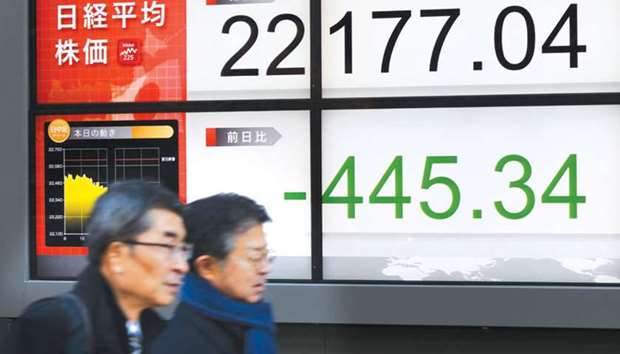Technology and energy firms were the biggest losers as Hong Kong and Tokyo led an Asian market plunge yesterday, extending retreats across Europe and New York.
A global equity rally has hit the buffers this week as the US probe into Russia’s alleged election meddling sows uncertainty, Britain struggles to reach a Brexit deal with the European Union and traders remain cautious about Washington’s ability to push through tax cuts.
A key drag for Asia yesterday was copper prices which sank more than 4% in London, having already lost about 10% over the previous week.
Analysts blamed a pick-up in the dollar on hopes for US tax cuts. There are also worries about China’s crackdown on borrowing-fuelled investing. “The sentiment in China has turned less positive after the conclusion of the national party congress, as the deleveraging rhetoric has returned to the market, especially with regards to real estate speculation,” TD Securities commodity strategist Ryan McKay told Bloomberg News.
“Worries of the deleveraging’s impact on real estate and construction demand saw optimism for commodity demand reduced and prices retreat.”
Oil prices were hit by data showing a big rise in US inventories.
Sydney-listed miner Rio Tinto shed 2.5% and BHP was 2% off, while energy giant Woodside Petroleum lost 0.3%. CNOOC, Sinopec and PetroChina dived in Hong Kong while Inpex was hammered more than 3% in Tokyo. The losses hit wider markets. Tokyo ended 2% down.
“The adjustment mode is deepening lately in the Japanese stock market,” said Shunichi Otsuka, general manager in the research department at Ichiyoshi Securities in Tokyo.”It’s difficult to buy unless US equities show firmness, even as some high-tech shares are becoming cheap.”
Hong Kong lost 2.1%, leaving it more than 6% off its decade peak touched just over a fortnight ago.
Shanghai closed 0.3% down and Sydney was 0.4% lower following weaker-than-forecast economic growth data, which also dragged down the Australian dollar on expectations the country’s central bank will not raise interest rates any time soon.
Seoul gave up 1.4%, while Taipei shed 1.6% and Wellington dropped 0.6%. In early European trade, London fell 0.4%, while Paris lost 1% and Frankfurt 1.2%. Greg McKenna, chief market strategist at AxiTrader, said since the US tax cuts look set to be agreed, the fall in prices could be caused by a so-called “buying the rumour, sell the (almost) fact”, mixed with profit-taking following a healthy run-up this year.
The tech sector, which has been the best performer this year, was again in the red on profit-taking and as dealers shifted to firms more likely to benefit from lower US taxes.
Tencent dived 2.7% and AAC technologies was 7.3% lower, extending a profit-taking slump that kicked in last month.
Tencent in November joined the exclusive club of firms with a market cap of $500bn, having surged 140% in 2017.
And AAC had almost trebled in value since the start of the year until hitting its all-time high three weeks ago.
Samsung was off 2.4% in Seoul and Sony more than 3% lower in Tokyo.
On currency markets the pound was in trouble, with British-EU talks in limbo after the government’s coalition partner dismissed Prime Minister Theresa May’s position on the future of Northern Ireland’s border with eurozone member Ireland.
May is expected in Brussels again this week to try to get an agreement that would let her move the talks on to trade.
Bitcoin hit another record high of $12,519 as the cryptocurrency continues to attract interest from investors, having risen 15-fold since mid-January.
In Tokyo, the Nikkei 225 closed down 2.0% at 22,177.04 points; Hong Kong — Hang Seng fell 2.1% at 28,224.80 points and Shanghai — Composite ended down 0.3% at 3,293.96 points yesterday.

Businessmen walk past a stock quotation board in Tokyo. The Nikkei 225 closed down 2.0% to 22,177.04 points yesterday.
